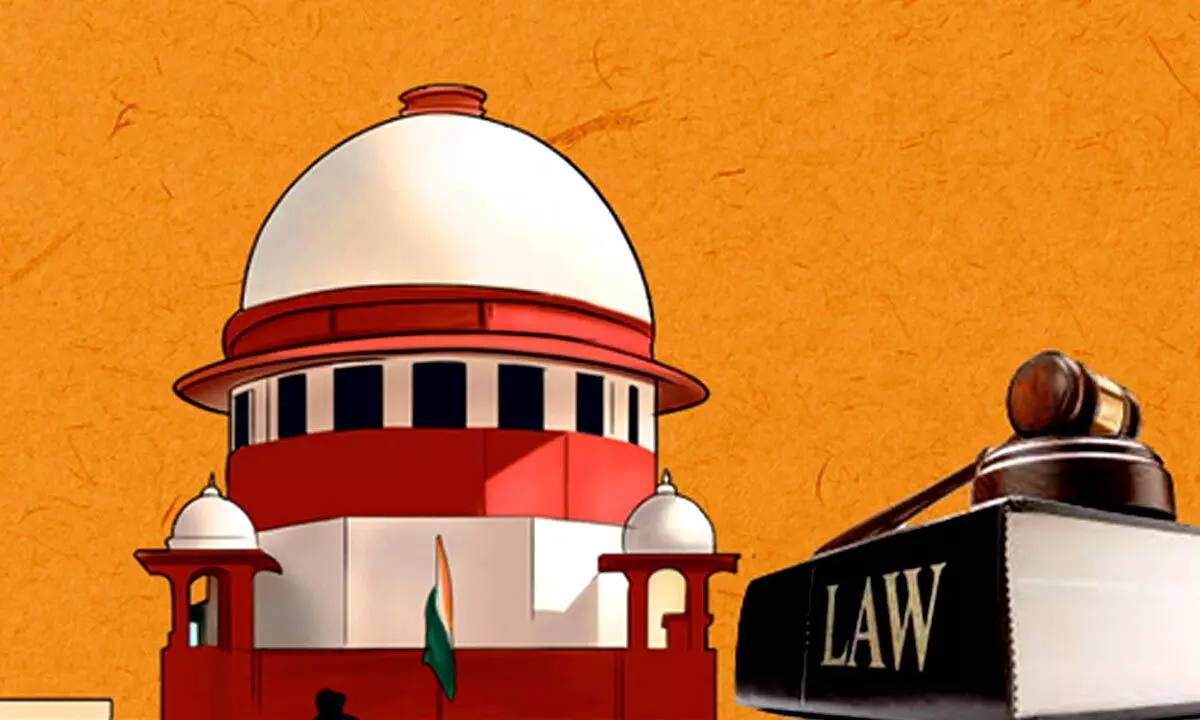Live
- Cyberabad police holds meet with hostel owners
- Guv read from Congress’ ‘lies-based’ script, flays BJP
- AP Assembly Budget Sessions: Key Discussions and Bills Set for Thursday
- Guv spoke like ‘Congress karyakarta’: KTR
- Governor’s address mirrors Rising Telangana: Congress
- RPF personnel assist woman to deliver safely at Sec’bad station
- VMRDA takes up two iconic projects in Vizag
- Chilkur priest meets former V-P Venkaiah Naidu
- CMR launches jewellery showroom in Eluru
- VPA celebrates Women’s Day
SC moved by prolonged legal battle of woman against divorce


The trials and tribulations of a woman fighting a protracted legal battle against a family court granting the decree of divorce to her estranged husband multiple times has moved the Supreme Court to the extent that it said the judicial system was “grossly injudicious” to her.
New Delhi: The trials and tribulations of a woman fighting a protracted legal battle against a family court granting the decree of divorce to her estranged husband multiple times has moved the Supreme Court to the extent that it said the judicial system was “grossly injudicious” to her.
The woman, who got married in 1991, gave birth to a son a year later and was deserted by her husband. He filed for divorce in a family court in Karnataka which not once but thrice granted the decree of divorce in favour of her husband disregarding the fact that he was not paying anything either to her or their minor child for maintenance. The family court was asked multiple times by the high court, which the woman approached against the grant of divorce, to decide afresh the petition of her husband. Each time the man managed to get the divorce decree. The high court, in the third instance, approved the family court’s decision granting divorce to the husband on payment of permanent alimony of Rs 20 lakh. The local court had awarded Rs 25 lakh to the woman.
The history of the matrimonial dispute, spanning nearly three decades without the woman getting sufficient money as alimony, caught the attention of a bench of Justices Surya Kant and Ujjal Bhuyan. The top court deprecated the manner in which the family court kept on passing the decrees of divorce. “On perusal of the record, it seems to us that the judicial system has been grossly injudicious to the appellant and her minor child, who has now attained majority. We say so for the reason that it is the respondent who subjected the appellant to extreme cruelty all these years, and never came forward to render any assistance for securing a better future for his own son or offered to pay even for his school education.
“The respondent’s own mother has been staying with her daughter-in-law/ appellant all these years and has come forward against him. The mechanical manner in which the family court kept on passing decrees of divorce against the appellant not only exhibit a lack of sensitivity, but also suggests a hidden prejudice against the appellant. The courts ought not to have accorded any premium to the respondent’s own misdemeanors,” the bench said.
The court, however, said it cannot be oblivious of the fact that the parties are living separately since 1992 and therefore sustained the decree of divorce granted by the family court conditionally.
Frowning upon the misdemeanours of the husband, the bench said the claim of irretrievable breakdown of marriage cannot be used to the advantage of a party solely responsible for “tearing down the marital relationship.”
The apex court not only enhanced the alimony of Rs 20 lakh by Rs 10 lakh more but also ordered that the house currently occupied by the woman, her son, and her mother-in-law will remain with them and barred the man from interfering with the peaceful possession of the property. “If the respondent owns any other immovable property, the son of the parties shall have preferential ownership rights in the same irrespective of any transfer of title by the respondent. This direction is necessitated for the reason that he (the couple’s son) has an indefeasible and enforceable right to seek maintenance and adequate amount towards his school and higher education,” the bench said.
Making the directions compulsorily enforceable, the top court warned the man that non-compliance would automatically render the decree of divorce “null and void”. It asked the man to pay the alimony within three months with seven per cent annual interest since August 3, 2006, the day the first decree of divorce was passed. “Similarly, if the respondent fails to pay the above awarded amount to the appellant within the stipulated time, the family court is directed to take coercive action against him in accordance with law,” the bench said in a recent order. (PTI)

© 2025 Hyderabad Media House Limited/The Hans India. All rights reserved. Powered by hocalwire.com






